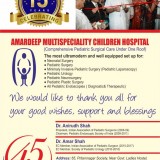INFORMATION AVAILABLE IN ENGLISH, GUJARATI AND HINDI
Anal fissures are tiny tears in the skin around the anus and can be painful. They usually develop as a side effect of constipation. Constipation is the condition where a person passes stools less frequently than usual and the stool is harder, drier and painful to pass.
What causes anal fissures?
They usually develop when your child is constipated. The sphincter (ring of muscle) around the anus stretches to let the hard dry stool pass, and the tissue around the anus may tear as a result.
What are the signs and symptoms of anal fissures?
Anal fissures are usually small but can be painful, as the tissue around the anus is supplied with lots of nerve endings. The tears can bleed bright red blood, which will show while washing or on the toilet paper but soon stops. After passing stools, they start to heal but can re-open the next time. They usually heal completely in a week or two, but only after the stool has softened.
How are anal fissures diagnosed?
Initially, the doctor will diagnose constipation from your child’s history. They may look at your child’s anus to see if any anal fissures are visible. Occasionally, the doctors may suggest your child has an examination under anesthetic, to check the anus more closely and confirm that it is otherwise normal.
How are anal fissures treated?
Treatment aims to reduce the constipation, so that stool is easier to pass and the tissues around the anus are less likely to tear. This may involve a change in diet to include higher fiber foods, medicines to soften the stool so it is less painful to pass, and laxatives to stimulate passing stool.
As well as reducing constipation, there are various options for making the anal fissures less painful until they heal. A warm bath can soothe the area for a while, but it should be patted dry rather than rubbed. Creams or ointments can be soothing, but certain ones containing steroids or anesthetics should only be used for a few days at a time.
What happens next?
Children who have developed anal fissures once are likely to develop them again. The key to preventing anal fissures is to avoid becoming constipated. Try to make sure your child to has a balanced diet containing plenty of fiber and encourage them to drink plenty of fluids.
GUJARATI
કબજિયાત
કઠણ ઝાડો થવો અને તે કરવામાં બાળક ને દુઃખાવો થાય પેટ ફૂલી જાય, વધુ પડતો ગેસ થાય તો અચુક ડાક્ટરની સલાહ મુજબ તપાસ કરાવવી અને દવા લેવી. ઘરગથ્થુ દવાઓ ન કરવી. ઝાડો દરરોજ ન થતો હોય, પણ બાળક પોચો સંડાસ ૨-૩ દિવસે કરે તો તેને કબજિયાત ન ગણવી.
કબજિયાત લગભગ જન્મથી હોય અને બાળકનું પેટ ફૂલે, વારંવાર એનીમા અપાવવા પડે અને બાળકનું વજન ન વધે તો ચોક્કસ આ મોટા આંતરડાની જન્મજાત બીમારી હોઈ શકે. આને હર્ષસ્પૃન્ગ ડીઝીઝ કહે છે. આ માટે બાળકના સર્જનને બતાવી બાળકની વધુ તપાસ જેમ કે બેરિયમ એનીમા અથવા રેક્ટલ બાયપસી કરાવવી પડે છે. •
HINDI
कब्ज
मल सख्त हो और उसे करने में बच्चे को दर्द हो, पेट फूल जाए, अत्यधिक गैस हो जाए तो डॉक्टर से अवश्य परामर्श करें और निर्देश के अनुसार जाँच कराएं और दवाइयां लेनी चाहिए। घरेलू दवाइयाँ नहीं लेनी चाहिए। मल हर रोज न होता हो, लेकिन बच्चा भले ही २-३ दिन में नरम संडास करे तो इसे कब्ज नहीं समझा जाना चाहिए। कब्ज जन्म से हो और बच्चे का पेट फूल जाए, बार-बार जुलाब देने की आवश्यकता पड़ती हो, और बच्चे का वजन न बढ़ रहा हो तो निसंदेह यह बड़ी आंत सम्बंधी जन्मजात बीमारी हो सकती है। इसे हर्षस्प्रंग रोग कहते हैं। बच्चे को सर्जन के पास ले जा कर अधिक जांच करानी पड़ती है जैसाकि बेरीयम एनिमा अथवा रेक्टल बायोप्सी।•




